2020考研英语:英语语法之系动词.doc
英语语法之系动词

5 seem, appear “似乎,看来”。可接形容词或动 词
不定式。
They do not seem kind to me. The students seem to be reading English when
Mr. Huang came in. He could also work out how far the stars would 6 staanpdp,eliaer有ed时to也h可av作e 系m动ov词ed,. 后接形容词,说明 句子主语处于某种状态。
She stopped and stood quite still. After a moment, the lion fell over and lay still.
1) become 多用来表示变的结果,常接形容词 或名词作表语。 The city will become rich. They became close friends.
2) get 多用来表示变化过程,常接形容词作表语。 It’s getting late. In the beginning, people who bought them often got angry. He’ll get well soon.
3 look, sound, taste, smell, feel。可接形容词或介 词短语。 She looked worried. That sounds like a good idea. When she feels unhappy, I feel the same.
4 stay, keep, remain表示保持、仍是。可接形容词 或介词短语。 How does sea water stay clean? I like to keep busy. If the tobacco companies want to remain in business, they have to encourage more young people to start smoking.
系动词的用法小结
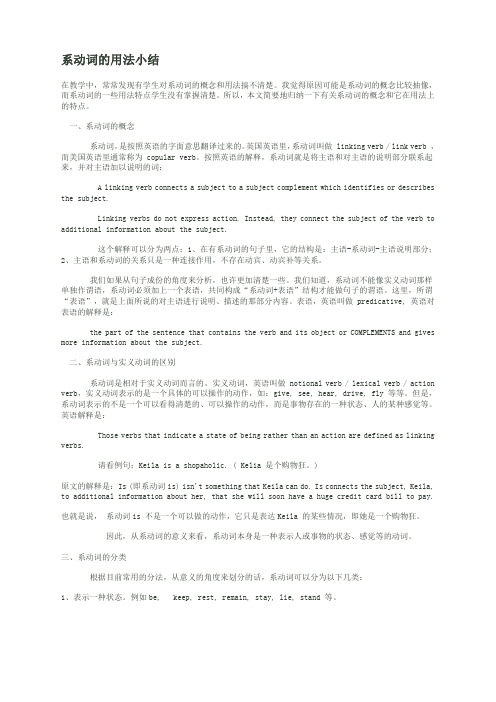
系动词的用法小结在教学中,常常发现有学生对系动词的概念和用法搞不清楚。
我觉得原因可能是系动词的概念比较抽像,而系动词的一些用法特点学生没有掌握清楚。
所以,本文简要地归纳一下有关系动词的概念和它在用法上的特点。
一、系动词的概念系动词,是按照英语的字面意思翻译过来的。
英国英语里,系动词叫做 linking verb / link verb ,而美国英语里通常称为 copular verb。
按照英语的解释,系动词就是将主语和对主语的说明部分联系起来,并对主语加以说明的词:A linking verb connects a subject to a subject complement which identifies or describes the subject.Linking verbs do not express action. Instead, they connect the subject of the verb to additional information about the subject.这个解释可以分为两点:1、在有系动词的句子里,它的结构是:主语-系动词-主语说明部分;2、主语和系动词的关系只是一种连接作用,不存在动宾、动宾补等关系。
我们如果从句子成份的角度来分析,也许更加清楚一些。
我们知道,系动词不能像实义动词那样单独作谓语,系动词必须加上一个表语,共同构成“系动词+表语”结构才能做句子的谓语。
这里,所谓“表语”,就是上面所说的对主语进行说明、描述的那部分内容。
表语,英语叫做 predicative, 英语对表语的解释是:the part of the sentence that contains the verb and its object or COMPLEMENTS and gives more information about the subject.二、系动词与实义动词的区别系动词是相对于实义动词而言的。
英语语法 系动词
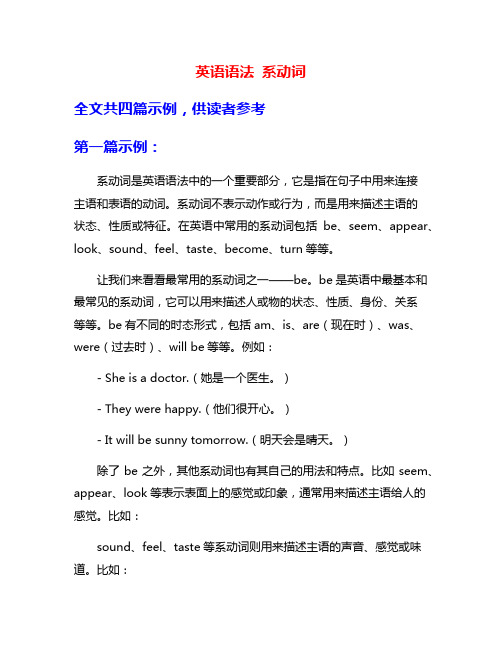
英语语法系动词全文共四篇示例,供读者参考第一篇示例:系动词是英语语法中的一个重要部分,它是指在句子中用来连接主语和表语的动词。
系动词不表示动作或行为,而是用来描述主语的状态、性质或特征。
在英语中常用的系动词包括be、seem、appear、look、sound、feel、taste、become、turn等等。
让我们来看看最常用的系动词之一——be。
be是英语中最基本和最常见的系动词,它可以用来描述人或物的状态、性质、身份、关系等等。
be有不同的时态形式,包括am、is、are(现在时)、was、were(过去时)、will be等等。
例如:- She is a doctor.(她是一个医生。
)- They were happy.(他们很开心。
)- It will be sunny tomorrow.(明天会是晴天。
)除了be之外,其他系动词也有其自己的用法和特点。
比如seem、appear、look等表示表面上的感觉或印象,通常用来描述主语给人的感觉。
比如:sound、feel、taste等系动词则用来描述主语的声音、感觉或味道。
比如:- The music sounds beautiful.(音乐听起来很美。
)- This fabric feels soft.(这种布料摸起来很软。
)- The soup tastes delicious.(这汤味道很美味。
)become和turn也属于系动词,它们表示主语从一种状态或性质变成另一种状态或性质。
比如:系动词在英语语法中扮演着连接主语和表语的重要角色,帮助我们准确地描述主语的状态、性质或特征。
熟练掌握系动词的用法不仅可以让我们的语言表达更加清晰准确,还可以帮助我们更好地理解和运用英语语法。
希望以上内容可以帮助大家更好地理解和掌握系动词的用法。
第二篇示例:系动词(linking verbs)是英语语法中的一类特殊动词,主要用于连接主语和主语的描述性补语。
系动词知识点总结
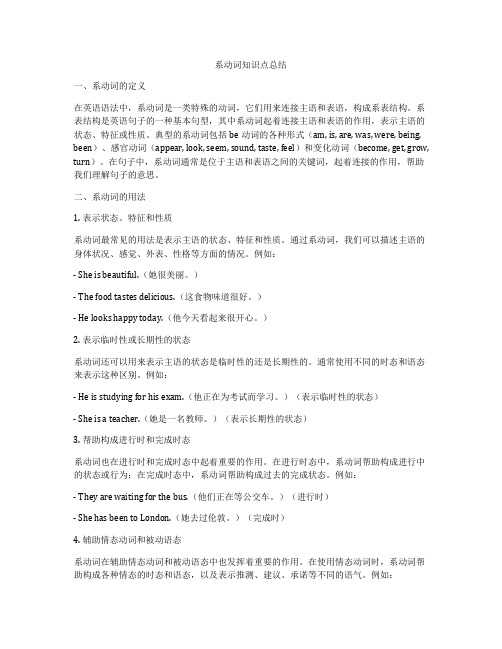
系动词知识点总结一、系动词的定义在英语语法中,系动词是一类特殊的动词,它们用来连接主语和表语,构成系表结构。
系表结构是英语句子的一种基本句型,其中系动词起着连接主语和表语的作用,表示主语的状态、特征或性质。
典型的系动词包括be动词的各种形式(am, is, are, was, were, being, been)、感官动词(appear, look, seem, sound, taste, feel)和变化动词(become, get, grow, turn)。
在句子中,系动词通常是位于主语和表语之间的关键词,起着连接的作用,帮助我们理解句子的意思。
二、系动词的用法1. 表示状态、特征和性质系动词最常见的用法是表示主语的状态、特征和性质。
通过系动词,我们可以描述主语的身体状况、感觉、外表、性格等方面的情况。
例如:- She is beautiful.(她很美丽。
)- The food tastes delicious.(这食物味道很好。
)- He looks happy today.(他今天看起来很开心。
)2. 表示临时性或长期性的状态系动词还可以用来表示主语的状态是临时性的还是长期性的。
通常使用不同的时态和语态来表示这种区别。
例如:- He is studying for his exam.(他正在为考试而学习。
)(表示临时性的状态)- She is a teacher.(她是一名教师。
)(表示长期性的状态)3. 帮助构成进行时和完成时态系动词也在进行时和完成时态中起着重要的作用。
在进行时态中,系动词帮助构成进行中的状态或行为;在完成时态中,系动词帮助构成过去的完成状态。
例如:- They are waiting for the bus.(他们正在等公交车。
)(进行时)- She has been to London.(她去过伦敦。
)(完成时)4. 辅助情态动词和被动语态系动词在辅助情态动词和被动语态中也发挥着重要的作用。
英语语法之【系动词】
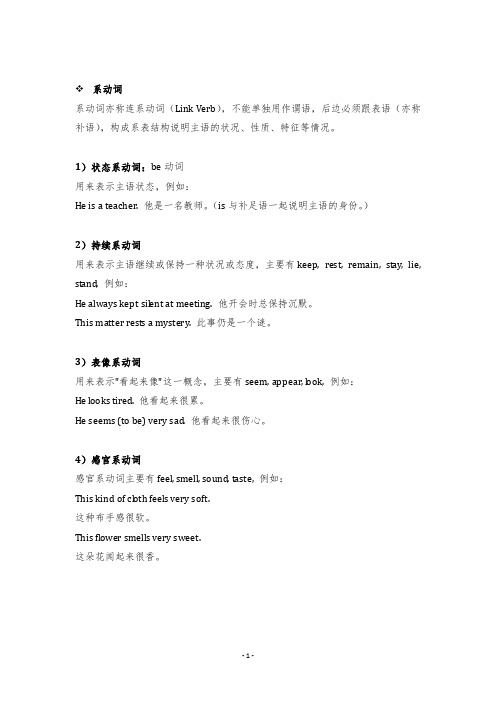
系动词系动词亦称连系动词(Link Verb),不能单独用作谓语,后边必须跟表语(亦称补语),构成系表结构说明主语的状况、性质、特征等情况。
1)状态系动词:be动词用来表示主语状态,例如:He is a teacher. 他是一名教师。
(is与补足语一起说明主语的身份。
)2)持续系动词用来表示主语继续或保持一种状况或态度,主要有keep, rest, remain, stay, lie, stand, 例如:He always kept sil ent at meeting. 他开会时总保持沉默。
This matter rests a mystery. 此事仍是一个谜。
3)表像系动词用来表示"看起来像"这一概念,主要有seem, appear, l ook, 例如:He looks tired. 他看起来很累。
He seems (to be) very sad. 他看起来很伤心。
4)感官系动词感官系动词主要有feel, smell, sound, taste, 例如:This kind of cl oth feels very soft.这种布手感很软。
This fl ower smells very sweet.这朵花闻起来很香。
5)变化系动词这些系动词表示主语变成什么样,变化系动词主要有become, grow, turn, fall, get, go, come, run.例如:He became mad after that. 自那之后,他疯了。
She grew rich within a short time. 她没多长时间就富了。
6)终止系动词表示主语已终止动作,主要有prove, trun out, 表达"证实","变成"之意,例如:The rumor proved false. 这谣言证实有假。
The search proved difficult. 搜查证实很难。
第九讲 系动词与实意动词(一)(英语语法系统全面讲解)
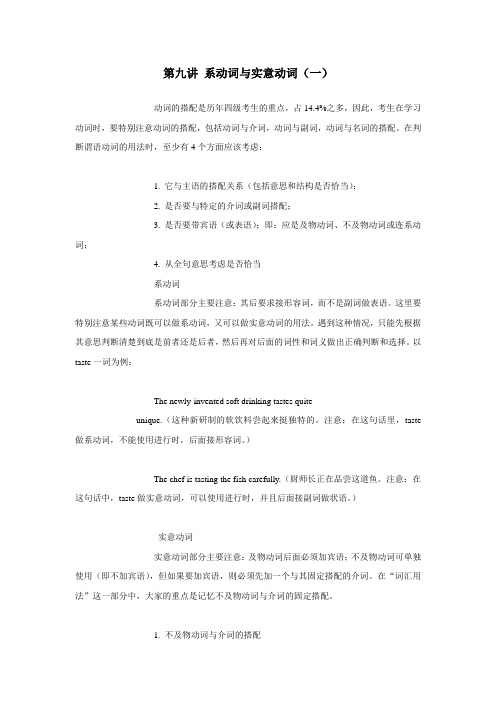
第九讲系动词与实意动词(一)动词的搭配是历年四级考生的重点,占14.4%之多,因此,考生在学习动词时,要特别注意动词的搭配,包括动词与介词,动词与副词,动词与名词的搭配。
在判断谓语动词的用法时,至少有4个方面应该考虑:1. 它与主语的搭配关系(包括意思和结构是否恰当);2. 是否要与特定的介词或副词搭配;3. 是否要带宾语(或表语);即:应是及物动词、不及物动词或连系动词;4. 从全句意思考虑是否恰当系动词系动词部分主要注意:其后要求接形容词,而不是副词做表语。
这里要特别注意某些动词既可以做系动词,又可以做实意动词的用法。
遇到这种情况,只能先根据其意思判断清楚到底是前者还是后者,然后再对后面的词性和词义做出正确判断和选择。
以taste一词为例:The newly-invented soft drinking tastes quiteunique.(这种新研制的软饮料尝起来挺独特的。
注意:在这句话里,taste 做系动词,不能使用进行时,后面接形容词。
)The chef is tasting the fish carefully.(厨师长正在品尝这道鱼。
注意:在这句话中,taste做实意动词,可以使用进行时,并且后面接副词做状语。
)实意动词实意动词部分主要注意:及物动词后面必须加宾语;不及物动词可单独使用(即不加宾语),但如果要加宾语,则必须先加一个与其固定搭配的介词。
在“词汇用法”这一部分中,大家的重点是记忆不及物动词与介词的固定搭配。
1. 不及物动词与介词的搭配例:1999年6月四级第61题The committee is totally opposed _____ any changesbeing made in the plansA) of B) on C) to D) againstbe opposed to 意思是“反对……”,符合本题。
全句的意思是:“委员会完全反对对计划进行任何的改变”。
2020年考研英语语法大全:动词及用法
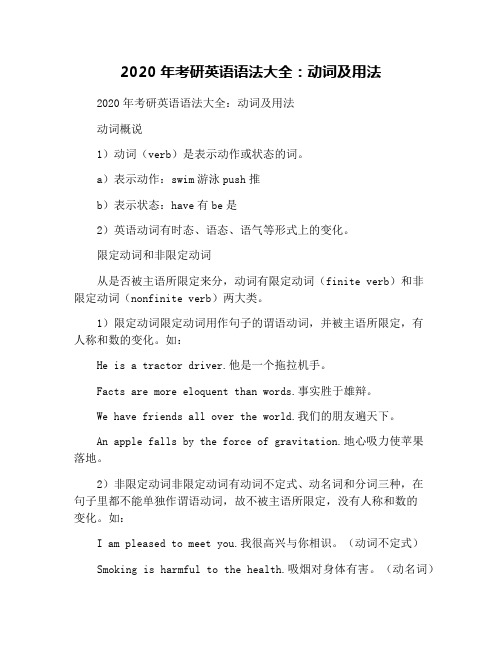
2020年考研英语语法大全:动词及用法2020年考研英语语法大全:动词及用法动词概说1)动词(verb)是表示动作或状态的词。
a)表示动作:swim游泳push推b)表示状态:have有be是2)英语动词有时态、语态、语气等形式上的变化。
限定动词和非限定动词从是否被主语所限定来分,动词有限定动词(finite verb)和非限定动词(nonfinite verb)两大类。
1)限定动词限定动词用作句子的谓语动词,并被主语所限定,有人称和数的变化。
如:He is a tractor driver.他是一个拖拉机手。
Facts are more eloquent than words.事实胜于雄辩。
We have friends all over the world.我们的朋友遍天下。
An apple falls by the force of gravitation.地心吸力使苹果落地。
2)非限定动词非限定动词有动词不定式、动名词和分词三种,在句子里都不能单独作谓语动词,故不被主语所限定,没有人称和数的变化。
如:I am pleased to meet you.我很高兴与你相识。
(动词不定式)Smoking is harmful to the health.吸烟对身体有害。
(动名词)I heard them singing the Internationale.我听见他们唱《国际歌》。
(分词)Spoken words are often more powerful than writing.语言往往比文字更有力。
(分词)实义动词、连系动词、情态动词和助动词从其含义来分,动词有实义动词(notional verb),连系动词(1ink verb),情态动词(modal verb)和助动词(auxiliary verb)四类。
1)实义动词实义动词有完全的词义,并能独立作谓语动词。
如:The sun shone brightly this morning.今天早晨阳光灿烂。
初中英语语法大全之连系动词.doc
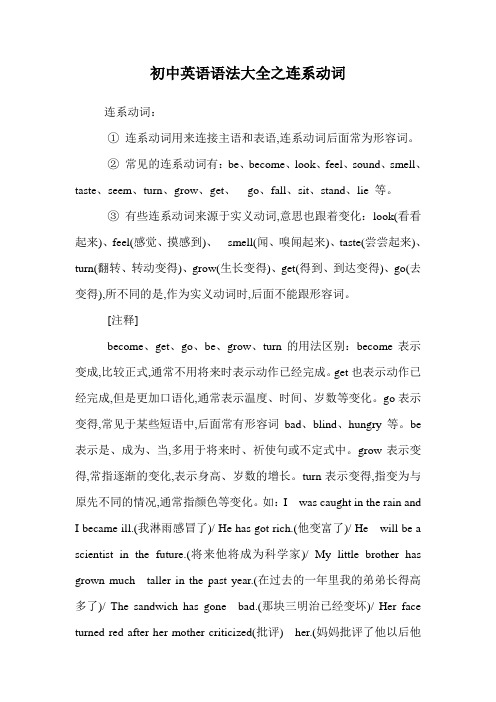
初中英语语法大全之连系动词连系动词:①连系动词用来连接主语和表语,连系动词后面常为形容词。
②常见的连系动词有:be、become、look、feel、sound、smell、taste、seem、turn、grow、get、go、fall、sit、stand、lie 等。
③有些连系动词来源于实义动词,意思也跟着变化:look(看看起来)、feel(感觉、摸感到)、smell(闻、嗅闻起来)、taste(尝尝起来)、turn(翻转、转动变得)、grow(生长变得)、get(得到、到达变得)、go(去变得),所不同的是,作为实义动词时,后面不能跟形容词。
[注释]become、get、go、be、grow、turn的用法区别:become表示变成,比较正式,通常不用将来时表示动作已经完成。
get也表示动作已经完成,但是更加口语化,通常表示温度、时间、岁数等变化。
go表示变得,常见于某些短语中,后面常有形容词bad、blind、hungry等。
be表示是、成为、当,多用于将来时、祈使句或不定式中。
grow表示变得,常指逐渐的变化,表示身高、岁数的增长。
turn表示变得,指变为与原先不同的情况,通常指颜色等变化。
如:I was caught in the rain and I became ill.(我淋雨感冒了)/ He has got rich.(他变富了)/ He will be a scientist in the future.(将来他将成为科学家)/ My little brother has grown much taller in the past year.(在过去的一年里我的弟弟长得高多了)/ The sandwich has gone bad.(那块三明治已经变坏)/ Her face turned red after her mother criticized(批评) her.(妈妈批评了他以后他的脸变红了)希望上面对连系动词知识的讲解学习,能很好的帮助同学们对此知识的巩固学习,相信同学们一定会考出优异成绩的。
系动词的用法及口诀初中

系动词的用法及口诀初中在初中英语的学习中,系动词是一个重要的语法点。
掌握系动词的用法对于正确理解和运用英语句子至关重要。
下面,让我们一起来深入了解系动词的用法及相关口诀。
一、什么是系动词系动词,又叫连系动词,它本身有词义,但不能单独用作谓语,后边必须跟表语,构成系表结构说明主语的状况、性质、特征等情况。
常见的系动词有:be(am/is/are/was/were)、seem、look、feel、sound、taste、smell、become、get、turn、grow、go、come、fall、remain、stay、keep 等。
二、系动词的用法1、状态系动词be 动词是最常见的状态系动词,表示主语的身份、性质、状态等。
例如:“I am a student”(我是一名学生。
)“She is very beautiful”(她非常漂亮。
)remain 和 stay 表示“保持某种状态”。
如:“The weather remains cold”(天气仍然很冷。
)“He stayed calm in the face of danger”(在危险面前他保持冷静。
)2、感官系动词这类系动词主要有 look(看起来)、feel(摸起来,感觉)、smell (闻起来)、sound(听起来)、taste(尝起来)。
例如:“The cake tastes delicious”(这个蛋糕尝起来很美味。
)“The music sounds wonderful”(这音乐听起来很棒。
)3、变化系动词常见的变化系动词有 become、get、turn、grow、go 等。
它们表示主语从一种状态转变为另一种状态。
become 强调变化的结果,通常表示“变得,成为”。
例如:“He became a doctor”(他成为了一名医生。
)get 常表示“逐渐变得”,后常接比较级。
如:“It's getting colder and colder”(天气变得越来越冷了。
(完整word版)考研英语语法基础讲义
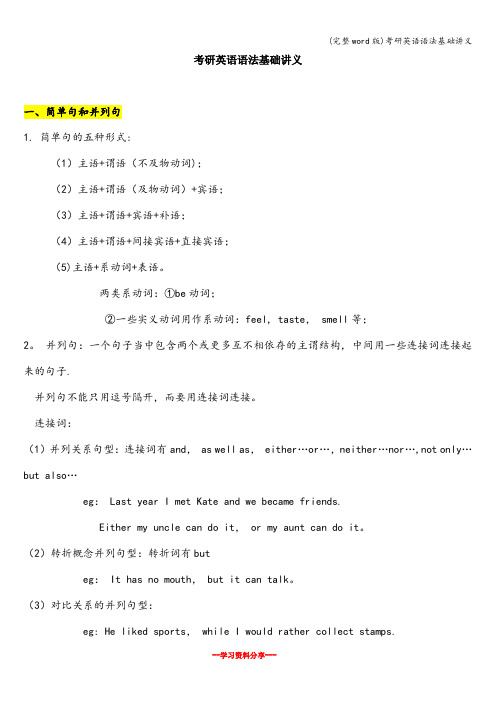
考研英语语法基础讲义一、简单句和并列句1. 简单句的五种形式:(1)主语+谓语(不及物动词);(2)主语+谓语(及物动词)+宾语;(3)主语+谓语+宾语+补语;(4)主语+谓语+间接宾语+直接宾语;(5)主语+系动词+表语。
两类系动词:①be动词;②一些实义动词用作系动词:feel, taste, smell等;2。
并列句:一个句子当中包含两个或更多互不相依存的主谓结构,中间用一些连接词连接起来的句子.并列句不能只用逗号隔开,而要用连接词连接。
连接词:(1)并列关系句型:连接词有and, as well as, either…or…,neither…nor…,not only…but also…eg: Last year I met Kate and we became friends.Either my uncle can do it, or my aunt can do it。
(2)转折概念并列句型:转折词有buteg: It has no mouth, but it can talk。
(3)对比关系的并列句型:eg: He liked sports, while I would rather collect stamps.练习:2009年6月阅读Cerling‘s team collected tap water samples from 600 cities and constructed a mop of the regional differences。
(简单句)Most hydrogen and oxygen atoms in water are stable, but traces of both elements are also present as heavier isotopes. (并列句)简单句和并列句是复合句的基础。
二、句子成分句子六大成分:主谓宾、定状表。
主语、宾语和表语:通常由代词或者名词构成,定语:修饰名词;状语:修饰形容词或者动词;表语:接在系动词后面;(一)。
考研英语复习:六大系动词剖析

考研英语复习:六大系动词剖析考研的知识点分叉很多,只有抓住了重点才能省时而又有效的备考,下面为你精心准备了“考研英语复习:六大系动词剖析”,持续关注本站将可以持续获取的考试资讯!考研英语复习:六大系动词剖析一说到系动词,很多同学会脱口而出系动词就是be动词,这样说不够全面准确,其实be动词只是系动词的其中一类,表现形式就是“am,is,are”以及它的其他时态,比如过去时“was,were”,完成时“has been,have been,had been”。
关于be动词相信大家还是比较熟悉的,在这里老师不再赘述。
我要给大家详细讲解的是除了be动词以外的其他五类系动词,下面老师结合例子给同学们一一讲解:第一类叫做表像系动词,比如:seem,appear。
seem这个词同学们应该比较熟悉,通常翻译为“似乎,好像”,但是appear 这种既有实义动词意思又有系动词意思的单词,在翻译时就需要引起同学们的重视,比如我举两个例子:he appeared suddenly 他突然出现了。
He appears unhappy他好像不开心。
那么大家也注意到了appear在两个例句中分别表示的是不同的含义,因为在第一句中,appear做实义动词,所以意为“出现”,而在第二句中做系动词,所以意为“似乎,好像”。
那么究竟如何区分呢?很简单,做实义动词时,后面通常接副词,而做系动词时,后面通常接形容词或名词。
第二类叫做感官系动词,比如:sound,look,smell,taste,feel。
这五个系动词分别对应着人的五种感官,所以称之为感官系动词,这些系动词后面都可以接形容词做表语,比如:it sounds good,the fish smells good,the cloth feels smooth,she looks beautiful,it tastes sweet.翻译时意思比较固定,不算很难。
第三类系动词叫做持续系动词,比如:keep,remain,stay.这些系动词后面接形容词时表示的含义都是“保持”,比如:keep silent“保持沉默”,remain做系动词时指的是某人或某事物仍保持某种状态,意为“仍然”,比如:The situation remains tense.“局势依旧很紧张”。
专题动词辨析2023中考英语语法复习之考点原卷版

专题动词辨析2023中考英语语法复习之考点原卷版2023中考英语语法复习之考点一网打尽专题九动词辨析目录考点1 系动词(be动词)考点2 系动词(感官动词)考点3 系动词(其他系动词)考点4(难点)使役动词(make/let/have/get)考点5 近义动词辨析(borrow/lend/keep)考点6 近义动词辨析(offer/provide)考点7 近义动词辨析(speak/say/tell/talk)考点8 近义动词辨析(take/spend/cost/pay)考点9 近义动词辨析(receive/accept)考点10 近义动词辨析(其他)考点11 动词词义辨析考点1 系动词(be动词)考点讲解精选练习1.(2021·黑龙江牡丹江)Fresh water ________ more important than anything else.A.is B.are C.was2.(2020·黑龙江)Spending time with families ________ the happiest thing.A.are B.is C.be3.(2020·黑龙江大兴安岭地)To avoid gathering (聚集), neither the students nor their head teacher __________ going to the party this evening.A.was B.are C.is4.(2021·江苏·高港实验学校二模)—I’ll drink half of the apple juice. The rest ________ for you, Sandy. —Only for us t hree? I’m afraid the rest ________ going to be unhappy.A.is; are B.are; is C.is; is D.are; are5.(2021·吉林长春)There __________ two people waiting for you outside now.A.is B.are C.was D.were6.(2021·四川遂宁)The number of the whales ________ smaller and smaller because of human activities now.A.were B.was C.is D.are7.(2020·广西崇左)Both Mike and his sister Lucy ________ good at Chinese.A.is B.am C.are D.be考点2 系动词(感官动词)考点讲解精选练习8.(2021·湖北恩施·二模)—What’s mom cooking in the kitchen?—Chicken, I guess. How nice it ________!A.looks B.smells C.tastes9.(2019·辽宁抚顺)Sometimes the smooth surface of the lake really __________like a mirror. A.sounds B.looks C.smells D.tastes10.(2020·甘肃兰州)—Mom, what are you cooking in the kitchen? It ________ delicious. —I’m preparing a hot pot dinner.A.tastes B.smells C.sounds D.feels11.(2020·山东济南)His voice ________strange on the phone. What happened?A.looked B.sounded C.tasted D.smelled12.(2020·湖北襄阳)— How does the banana milk shake ___________? —Delicious. I’d like to have another glass.A.look B.smell C.taste D.sound考点3 系动词(其他系动词)考点讲解精选练习13.It’s _____ rather cold. I shall put my coat on.A.getting B.looking C.starting D.feeling14.The green leaves and beautiful flowers______more beautiful after the rain.A.seem B.feel C.taste15.When the boy heard the words, his face ______ red.A.got B.turned C.changed考点4(难点)使役动词(make/let/have/get)精选练习16.Bert can't get the work ________ by 7:00 pm. He needs more time.A.finish B.to finish C.finished D.finishing17.(2020·黑龙江大庆)— What's next? — I'll have Tony ________ you around.A.to show B.show C.showed D.shown18.(2021·江苏无锡·九年级期中)There i s something wrong with my father’s computer. He wants to have someone ________ it and have it ________.A.check; repair B.check; repaired C.checked; repaired D.checked; repair19.(2020·上海宝山·一模)Emily’s mother felt it necessary to let her daughter________her own decision this time.A.to make B.makes C.make D.making20.(2021·上海普陀·二模)The kind doctor usually tells jokes to make his patients ________ better.A.feel B.felt C.to feel D.feeling21.(2021·福建·模拟预测)— What did she shout just now? — The traffic was so noisyand she had to made herself ________ clearly.A.hear B.to hear C.heard考点5 近义动词辨析(borrow/lend/keep)精选练习22.(2020·贵州黔东南)Sam ________ a computer from me yesterday.A.sold B.borrowed C.lent D.returned23.(2021·山东平阴·二模)—How long have you _________ these books? —For two weeks.I bought them from the biggest bookstore in our cityA.kept B.borrowed C.sold D.bought24.(2021·湖北黄石)—How long may I ________ your magazine? —For one week. But it mustn’t ________ to others.A.borrow; lend B.keep; be lent C.lend; be borrowed D.have; lend25.(2021·黑龙江·齐齐哈尔市碾子山区教师进修学校一模)— Could you ________ me your bike, Tom?— OK. And you can ________ it for a week.A.lend; keep B.borrow; lend C.lend; borrow考点6 近义动词辨析(offer/provide)精选练习26.(2020·辽宁丹东)—How's it going, Tina? —Great. My company has ________ me a good job.A.offered B.provided C.introduced D.discovered27.(2021·山东·东营市垦利区教学研究室一模)—How is your father’s life now?—Very good. A big company ________ him a good job.A.provided B.offered C.passed D.introduced28.(2020·黑龙江牡丹江)“Stall Economy”(地摊经济) has won high praise from Premier Li Keqiang because it can _______ the people with more chances to work.A.offer B.provide C.give29.(2021·江苏·淮安市黄集九年制学校一模)Zhang Guimei set up a high school to ________ free education ________ girls from poor families.A.offer; / B.offer; for C.provide; with D.provide; for考点7 近义动词辨析(speak/say/tell/talk)精选练习30.(2021·天津津南·一模)I can ________ English with you whenever we meet.A.say B.speak C.tell D.talk31.(2020·广西贵港)—Look! There is a girl under the tree. —She is Susan's daughter. She is only six years old, but she can ___________stories in English.A.say B.speak C.tell D.talk32.(2021·湖北襄州·模拟预测)Could you please ________ us a history story?A.speak B.tell C.say D.talk考点8 近义动词辨析(take/spend/cost/pay)精选练习33.(2021·甘肃·平凉市崆峒区教育科学研究所一模)Although the book________ me nearly 100 yuan, it’s really worth ________.A.took,to read B.spent, reading C.paid, to read D.cost, reading34.(2021·江苏连云港)Jim, you’d better not ________ too much time on your mobile phone. A.cost B.spend C.take D.pay35.(2021·黑龙江虎林)It ________ Zhang Guimei many years to help about 1,800 girl students in poor areas realize their college dreams.A.took B.spent C.cost考点9 近义动词辨析(receive/accept)考点讲解精选练习36.(2021·安徽砀山·一模)Everyone has bad days sometimes. But if someone tries to cheer you up, just try to ________their help.A.accept B.refuse C.receive D.answer37.(2021·四川凉山·一模)Mary ________ a camera from her fr iend, but she didn’t ________ because it was too expensive.A.received; accept B.accepted; receive C.accepted; accepted D.received; receive考点10 近义动词辨析(其他)考点讲解精选练习38.(2021·内蒙古赛罕·二模)—What did the doctor say? —He ________ me not to eat too much candy.A.suggested B.made C.stopped D.advised39.(2021·黑龙江绥化)Mum, could you help me _______ my toy car? I can’t ________ it anywhere!A.look for; find B.find; look for C.look; find out40.(2020·西藏)I often ________ magazines and my grandparents always ________ TV. A.watch: read B.read; watch C.look; watch D.see; look41.(2020·辽宁盘锦)Peter __________ first prize in the speech competition. We were proud of him.A.beat B.won C.lost D.took考点11 动词词义辨析精选练习42.(2020·湖北孝感)—Dear friends, do you still remember why you came here three years ago? —To __________ our dreams!A.copy B.save C.imagine D.achieve43.(2021·安徽休宁·二模)—Henry never gives in when facing difficulties. —So he does. We all ________ his strong spirit in life.A.expect B.admire C.remind D.share44.(2021·青海·海东市教育研究室一模)—We’ll make a trip to Hainan Island next weekend. Will you go with us? —No, I can’t ________ it at present.A.afford B.save C.offer45.(2021·浙江·模拟预测)The headmaster advises parents to ________ the parents’ meeting with their children this Friday.A.manage B.discuss C.control D.attend46.(2021·山东东营)—What a great success the film Hi, Mum has made! —That’s true. So far it has ________ tens of millions of people to go to the cinema.A.attracted B.expected C.requested D.encouraged47.(2021·江苏南京·二模)________ your mistakes and treat them as chances to improve yourself.A.Receive B.Accept C.Avoid D.Keep48.(2021·辽宁沈阳)Tom’s old computer ran fast five years ago, but little by little it ________ really slow.A.looked B.became C.sounded D.stayed49.(2021·湖北武汉)The official newspaper ________ the news of Tiangong 1, for it took a big step forward into space.A.heard B.checked C.believed D.celebrated50.(2020·山东东营)5G, as a new global network (全球网络) after 3G and 4G, will certainly ________ our life in many ways.A.copy B.break C.change D.control51.(2020·天津)I w as busy this morning and didn’t have time to ________ my email. A.waste B.punish C.believe D.check52.(2021·江苏常州)Don’t ________ your child with others because every child is a treasure. A.compare B.complain C.contact D.consider53.(2020·江苏南通)The children are jumping excitedly because they have _______ the design perfectly in groups.A.completed B.controlled C.contacted D.caused54.(2021·江西章贡·一模)All of us should ________ Alice because she has passed the college examination successfully.A.examine B.separate C.congratulate D.refuse55.(2020·湖北襄阳)— Can your little brother ___________ from 1 to 100? — Yes. He began to learn to say the simple numbers at the age of one.A.count B.hear C.guess D.spread56.(2021·湖北荆州)— Do you know Zhang Guimei, who was honored as one of the “People Who Moved China”?— Yes, she ______ the first free high school for girls in mountain areas and has helped more than 1,800 students to go to college.A.educated B.created C.memorized D.dreamed57.(2021·天津)The government plans to ________ more jobs for young people in western China.A.create B.avoid C.borrow D.guess58.(2020·山东日照)It's good for us to ________ a good habit of reading.A.develop B.choose C.accept D.pick59.(2021·山东·模拟预测)—Do you know who ________ the tomb of Emperor Qin and who ________ the mobile phone? —No, but we may ask our teacher. A.discovered, invented B.was discovered, was inventedC.invented, discovered D.was invented, was discovered60.(2021·江苏镇江)Customers are ________ to bring their own bottles to buy milky tea and it can reduce the use of disposable(一次性)cups.A.ordered B.encouraged C.chosen D.warned61.(2021·四川沙湾·二模)If we ________ this glass with red wine, we’ll find the glass________ more beautiful.A.fill; looks B.compare; tastes C.make; feels62.(2020·江苏徐州)If steel is heavier than water, why are ships able to ________ on the sea? A.float B.fly C.fall D.flow63.(2020·山东济南)It's important for students to ________ the school rules.A.break B.play C.follow D.refuse64.(2021·四川乐山)The Internet is so closely connected with our daily life. Can you__________a life without it?A.imagine B.expect C.understand65.(2020·江苏南京)China’s efforts to stop the spread of COVID-19 will ________ the world’s ability to limit the harm in the near future.A.imagine B.invent C.insist D.improve66.(2020·辽宁辽阳)Developing good reading habits can ___________ our reading speed. A.review B.receive C.spread D.increase67.(2021·山东南区·二模)—What you see ________ your thinking. —Yes, you’re right. A.are B.includes C.produces D.influences68.(2021·浙江浙江·模拟预测)— Jimmy? please take out your textbook. — Sorry, Sir. I________ it at home this morning.A.left B.forgot C.missed D.found69.(2020·江苏扬州)—I’m tired out. I have stayed up late the whole week.—You'dbetter________ your time better and have things organized.A.make B.have C.take D.manage70.(2021·江苏玄武·一模)Tiny things always remind me of what really ________ in our lives. A.makes B.matters C.manages D.minds71.(2021·安徽砀山·三模)—What did she say in his letter? Is everything OK with her study? —No idea. She didn’t ________ it in the letter.A.notice B.prepare C.learn D.mention72.(2020·湖北宜昌)—Would you ____________ opening the window? Get more freshair. —Of course not. I’ll do it right away.A.consider B.practice C.suggest D.mind73.(2021·山东菏泽)—Is anything worth seeing in Xi’an?—Yes. Don’t ________ the amazing Terracotta Army.A.offer B.miss C.share74.(2020·江苏镇江)All my family members think people should___________ doctors and nurses for their contributions.A.promise B.praise C.present D.prepare75.(2021·贵州黔东南)—What about going for a picnic this weekend? —I’d like to, but the final exam is coming. I ________ to stay at home.A.prefer B.discover C.refuse D.achieve76.(2021·江苏·苏州市景范中学校二模)Wetlands are important because they help ________ flood.A.project B.protect C.produce D.prevent77.(2021·辽宁辽阳)Our national hero Yue Fei _______ to devote (贡献) himself to the country at a young age.A.failed B.forgot C.promised D.refused78.(2021·山西)—To ________ our eyesight, we’d better relax for a while after reading for a long time. — I agree with you.A.harm B.protect C.examine79.(2021·江苏锡山·模拟预测)—It ___________ boring to take such a guessing game. —Well, it depends.A.heard B.proved C.remained D.discovered80.(2021·江苏南京)The drama “Yuhuayao” ________ citizens in Nanjing with a chance to learn and listen to the Party’s history.A.provided B.guarded C.compared D.protected81.(2020·辽宁大连)Last Thursday when I got to the airport, I ________ I had left my ticket at home.A.forgot B.realized C.believed D.seemed82.(2021·江苏秦淮·二模)Since I need to hand in a book report tomorrow, I have decidedto ________ Tom’s invitation to his birthday party tonight.A.repeat B.refuse C.remember D.research83.(2020·辽宁大连) Yao Ming is ____as one of the most popular basketball players in the world.A.regarded B.made C.kept D.watched84.(2021·吉林二道·一模)Don’t miss the chance when you can catch it, or you will ________ it someday.A.decide B.agree C.regret D.repeat85.(2021·内蒙古包头)—I’ll go back to my hometown, honey. ________ to buy me a ticket, please. — OK, single or return?A.Regret B.Remain C.Require D.Remember86.(2021·江西宜春·一模)—Why have you read the poem so many times? —Because it________ me of my happy junior high school days.A.cheats B.reminds C.provides D.discovers87.(2021·湖北襄阳)—Would you please ________ what you said? —Sure. I asked you to have a rest. It’s too hot today.A.show B.spell C.review D.repeat88.(2021·安徽无为·三模)—Did Mr. Brown _______ to you about that question at once? —No, he must be very busy preparing his lesson at that moment.A.repeat B.reply C.smile D.answer89.(2021·江苏建邺·二模)—I didn’t understand what Mr. Li said just now and I am a little worried now. —Don’t worry. He promised to_________the main points before the exam. A.review B.receive C.respect D.require90.(2021·安徽·合肥市第四十二中学三模)Reading a lot after school is a good way for students to ________ the hunger for knowledge.A.satisfy B.refuse C.avoid D.cut。
英语语法系动词
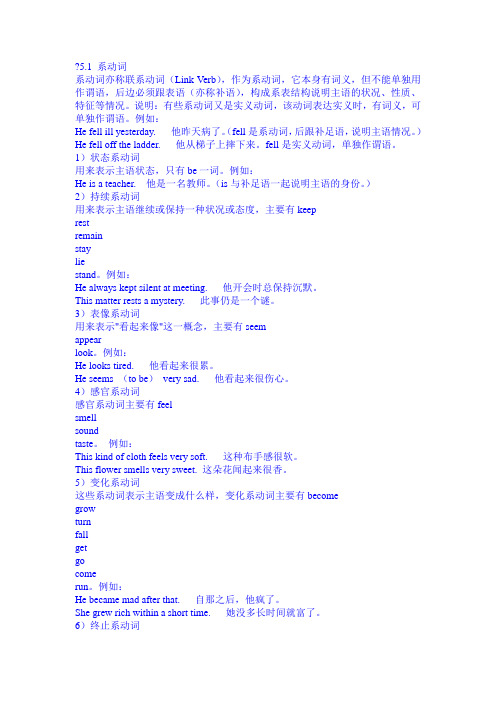
?5.1 系动词系动词亦称联系动词(Link Verb),作为系动词,它本身有词义,但不能单独用作谓语,后边必须跟表语(亦称补语),构成系表结构说明主语的状况、性质、特征等情况。
说明:有些系动词又是实义动词,该动词表达实义时,有词义,可单独作谓语。
例如:He fell ill yesterday.他昨天病了。
(fell是系动词,后跟补足语,说明主语情况。
)He fell off the ladder.他从梯子上摔下来。
fell是实义动词,单独作谓语。
1)状态系动词用来表示主语状态,只有be一词。
例如:He is a teacher.他是一名教师。
(is与补足语一起说明主语的身份。
)2)持续系动词用来表示主语继续或保持一种状况或态度,主要有keeprestremainstayliestand。
例如:He always kept silent at meeting.他开会时总保持沉默。
This matter rests a mystery.此事仍是一个谜。
3)表像系动词用来表示"看起来像"这一概念,主要有seemappearlook。
例如:He looks tired.他看起来很累。
He seems (to be)very sad.他看起来很伤心。
4)感官系动词感官系动词主要有feelsmellsoundtaste。
例如:This kind of cloth feels very soft.这种布手感很软。
This flower smells very sweet. 这朵花闻起来很香。
5)变化系动词这些系动词表示主语变成什么样,变化系动词主要有becomegrowturnfallgetgocomerun。
例如:He became mad after that.自那之后,他疯了。
She grew rich within a short time.她没多长时间就富了。
6)终止系动词表示主语已终止动作,主要有proveturn out表达"证实","变成"之意。
2020英语语法专项--情态动词与系动词
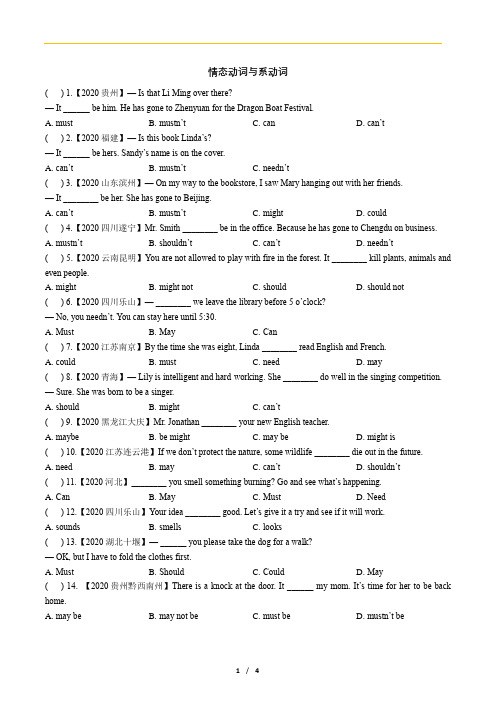
情态动词与系动词( ) 1.【2020贵州】— Is that Li Ming over there?— It ______ be him. He has gone to Zhenyuan for the Dragon Boat Festival.A.mustB.mustn’tC.canD.can’t( ) 2.【2020福建】— Is this book Linda’s?— It ______ be hers. Sandy’s name is on the cover.A.can’tB.mustn’tC.needn’t( ) 3.【2020山东滨州】— On my way to the bookstore, I saw Mary hanging out with her friends.— It ________ be her. She has gone to Beijing.A.can’tB.mustn’tC.mightD.could( ) 4.【2020四川遂宁】Mr. Smith ________ be in the office. Because he has gone to Chengdu on business. A.mustn’t B.shouldn’t C.can’t D.needn’t( ) 5.【2020云南昆明】You are not allowed to play with fire in the forest. It ________ kill plants, animals and even people.A.mightB.might notC.shouldD.should not( ) 6.【2020四川乐山】— ________ we leave the library before 5 o’clock?— No, you needn’t. You can stay here until 5:30.A.MustB.MayC.Can( ) 7.【2020江苏南京】By the time she was eight, Linda ________ read English and French.A.couldB.mustC.needD.may( ) 8.【2020青海】— Lily is intelligent and hard-working. She ________ do well in the singing competition. — Sure. She was born to be a singer.A.shouldB.mightC.can’t( ) 9.【2020黑龙江大庆】Mr. Jonathan ________ your new English teacher.A.maybeB.be mightC.may beD.might is( ) 10.【2020江苏连云港】If we don’t protect the nature, some wildlife ________ die out in the future.A.needB.mayC.can’tD.shouldn’t( ) 11.【2020河北】________ you smell something burning? Go and see what’s happening.A.CanB.MayC.MustD.Need( ) 12.【2020四川乐山】Your idea ________ good. Let’s give it a try and see if it will work.A.soundsB.smellsC.looks( ) 13.【2020湖北十堰】— ______ you please take the dog for a walk?— OK, but I have to fold the clothes first.A.MustB.ShouldC.CouldD.May( ) 14. 【2020贵州黔西南州】There is a knock at the door. It ______ my mom. It’s time for her to be back home.A.may beB.may not beC.must beD.mustn’t be( )15.【2020湖北天门】May I have some more chicken? It ______ so delicious.A.feelsB.smellsC.tastesD.sounds( ) 16.【2020湖北仙桃】Oh! Mum, where’s my notebook? I ______ find it.A.can’tB.needn’tC.shouldn’tD.mustn’t( ) 17.【2020湖南益阳】— Must we clean the classroom at once?— No, you ______. You may clean it after school.A.mustn’tB.needn’tC.can’t( ) 18.【2020辽宁抚顺】I walked here today, so this bike ______ be mine.A.canB.mustn’tC.can’tD.must( ) 19.【2020甘肃省】You haven’t eaten all day. You ______ be very hungry.A.couldn’t beB.can’tC.mightD.must( ) 20.【2020内蒙古包头】He ______ sleep, although he tried to. One cup of coffee in the late afternoon caused him to stay awake almost all night.A.wouldn’tB.shouldn’tC.couldn’tD.mustn’t( ) 21.【2020四川广元】There ______ something wrong with my mobile phone. It can’t work these days.A.must beB.can’t beC.may be( ) 22.【2020湖北鄂州】— Whose textbook is it? Is it Jenny’s?— No, it ______ be Jenny’s. Look, Helen’s name is on the cover. I think it ______ be Helen’s.A.can’t; mustB.mustn’t; mustC.can’t; mayD.mustn’t; may( ) 23.【2020湖北黄冈】— Is this blue schoolbag Lucy’s?— No. It ______ be hers. Her schoolbag is pink.A.mustB.mustn’tC.can’tD.may( ) 24.【2020四川成都】— Look! People outside are wearing thick coats.— The weather ______ be very cold.A.mightB.mustC.can’t( ) 25.【2020江苏徐州】Mother had a hard time getting Helen up in the morning. She called and called, but Helen ______ wake up.A.wouldn’tB.mustn’tC.needn’tD.shouldn’t( ) 26.【2020北京】— ______ you give me a hand? I can’t move the box by myself.— No problem.A.CouldB.ShouldC.MustD.Need( ) 27.【2020辽宁营口】— Where are my keys? I’m afraid I lost them again.— Don’t worry! With the new lock, you ______ search for them anymore.A.shouldn’tB.can’tC.mustn’tD.needn’t( ) 28.【2020贵州安顺】As we all know, using public chopsticks ______ necessary when we eat with others.A.isB.areC.was( ) 29.【2020贵州安顺】With the help of Air Classroom, students ______ keep learning even with schoolsclosed.A.canB.mustC.should( ) 30.【2020江苏镇江】I am proud that our Chinese survey team ______ successfully remeasure Qomolangma (再测珠穆朗玛峰), the world’s highest peak.A.mustB.canC.mayD.should( ) 31.【2020黑龙江龙东】— Mum, ______ I do my homework tonight?— No, you ______. But you must finish it before Sunday.A.need; mustn’tB.must; needn’tC.must; mustn’t( ) 32.【2020贵州黔南州】Polluted air and water ______ kill plants, animals, and even people.A.canB.can’tC.shouldD.shouldn’t( ) 33.【2020湖南怀化】— Where’s Jane?— I’m not sure. She ______ in the library.A.might beB.must beC.can’t be( ) 34.【2020四川自贡】— Must we wear school uniforms everywhere?— No, we ______.A.needn’tB.mustn’tC.can’t( ) 35.【2020江苏苏州】— Mum, why do I have to wash hands so many times a day?— For your health, you ______ be too careful.A.can’tB.shouldn’tC.mustn’tD.needn’t( ) 36.【2020江苏淮安】You ______ smoke here! Look at the sign. It says, “No smoking”.A.needn’tB.mustn’tC.canD.may( ) 37.【2020年辽宁丹东】Fresh water ______ more important than anything else.A. isB. areC. wasD. were( ) 38.【2020年江苏盐城】— My mother said you went on a Silk Road trip last year.— Yes, it ______ a wonderful trip.A. isB. wasC. will beD. were( ) 39.【2020贵州铜仁】— How delicious the meal is! Did Kangkang’s mother cook it?— It ______ be her. These days she has been in a poor village to help the people there.A. can’tB. won’tC. mustn’tD. needn’t( ) 40.【2020黑龙江牡丹江】— Mark, whose is the English paper with full marks? Do you know?— It ______ belong to Mary. She always gets the first place in the English exam.A.mustB.mightC.can’t( ) 41.【2020黑龙江牡丹江】— The talent show Youth With You (青春有你) is becoming hotter and hotter on line.— Exactly. Half of our class ______ interested in it recently.A.isB.areC.was( ) 42.【2020山东青岛】— Allen, shall we go to the bookstore this afternoon?— I’m sorry. David, but I ______ meet my cousin at the train station.A. have toB. canC. mayD. could( ) 43.【2020湖北咸宁】— Mum, it’s too hot. ______ I swim in the lake with my friend?— No, you ______. That’s too dangerous!A. Could; mustn’tB. Need; couldn’tC. Must; needn’tD. Should; can’t( ) 44.【2020湖北宜昌】— Listen! Linda is playing the erhu in the next room.— It ______ not be Linda. She has gone to Shanghai to visit her uncle.A. canB. mustC. needD. shall( ) 45.【2020江苏扬州】From the top of the Autumn Hill people ______enjoy the fullest sight of Ge Garden.A. have toB. needC. shouldD. can( ) 46. 【2020江苏无锡】You ______ be able to control all the things that happen to you, but you can decide not to be reduced by them.A. need notB. may notC. must notD. should not( ) 47.【2020江苏无锡】— Hmm, something ______ so good. Is it a cake? Can I try some?— Hand-made cookie. Still warm. Here you go!A. feelB. looksC. smellsD. tastes( ) 48.【2020湖北武汉】— I don’t care what people think.— Well, you ______. Some opinions are worth weighing.A. mightB. shouldC. couldD. would( ) 49.【2020新疆】— Look, Cindy. The flowers in our classroom come out in one night.— That’s fantastic! They are beautiful and colorful. They ______ nice.A. smellsB. smellC. soundsD. sound( ) 50.【2020江苏泰州】— In China, many students feel stressed because of too much homework.— Don’t worry. Our government has realized this problem. I’m sure there ______ be good news for them soon. A. can B. must C. should D. need答案:11. 情态动词与系动词1-5:DAACA6-10:AAACB11-15:AACCC16-20:ABCDC21-25:AACBA26-30:ADAAB31-35:BAAAA36-40:BABAA41-45:BAAAD46-50:BCBBB。
英语系动词的用法归纳

英语系动词的用法归纳The usage of verbs in the English language is an important aspect of grammar. Verbs are action words that express various actions, states, or occurrences. They play a crucial role in constructing sentences and conveying meaning. In this article, we will delve into the usage of English verbs and explore their different forms and functions.1. Verb forms:Verbs in English can have various forms, depending on the tense, mood, aspect, or voice. Common verb forms include the base form (infinitive), the present tense, the past tense, the present participle, and the past participle. For example:- Base form: to run- Present tense: I run- Past tense: I ran- Present participle: running- Past participle: run2. Regular and irregular verbs:Verbs in English can be categorized into regular and irregular verbs. Regular verbs form their past tense and past participle byadding "-ed" or "-d" to the base form. Irregular verbs, on the other hand, have unique forms that do not follow a specific pattern. Examples of regular verbs include "walked" and "talked," while irregular verbs include "went" and "ate."3. Verb tenses:English verbs have various tenses, which indicate the time of the action or event being described. Common tenses include the present simple, past simple, present continuous, past continuous, present perfect, and past perfect. Each tense has its own set of rules and usage. For instance:- Present simple: I eat an apple every day.- Past simple: I ate an apple yesterday.- Present continuous: I am eating an apple right now.- Past continuous: I was eating an apple when she arrived.- Present perfect: I have eaten an apple before.- Past perfect: I had eaten an apple before I went to bed.4. Verb mood:Verbs in English can also express different moods, which indicate the attitude or intention of the speaker. The three main verb moods are the indicative mood, the imperative mood, and thesubjunctive mood. The indicative mood is used to state facts or ask questions, the imperative mood is used to give commands or make requests, and the subjunctive mood is used to express hypothetical or unreal situations. For example:- Indicative: She is driving to work.- Imperative: Drive carefully!- Subjunctive: If I were you, I would apologize.5. Verb voice:The voice of a verb indicates whether the subject is performing the action (active voice) or receiving the action (passive voice). The active voice is more common and direct, while the passive voice is used when the focus is on the receiver of the action. For example: - Active voice: The cat chased the mouse.- Passive voice: The mouse was chased by the cat.6. Verb functions:English verbs have various functions in sentences. They can serve as the main verb, auxiliary verb, or modal verb. Main verbs carry the primary meaning in a sentence and can stand alone. Auxiliary verbs assist the main verb in forming verb phrases and expressing tense, aspect, or voice. Modal verbs express possibilities,permissions, obligations, and other attitudes. Examples of each include:- Main verb: She plays tennis every weekend.- Auxiliary verb: I am studying for my exams.- Modal verb: You should eat your vegetables.In conclusion, understanding the usage of verbs in English is essential for effective communication and constructing meaningful sentences. By familiarizing ourselves with verb forms, tenses, moods, voices, and functions, we can enhance our language skills and express ourselves accurately and appropriately. Practice and exposure to different examples will further solidify our understanding of this vital aspect of grammar.。
动词用法,英语语法
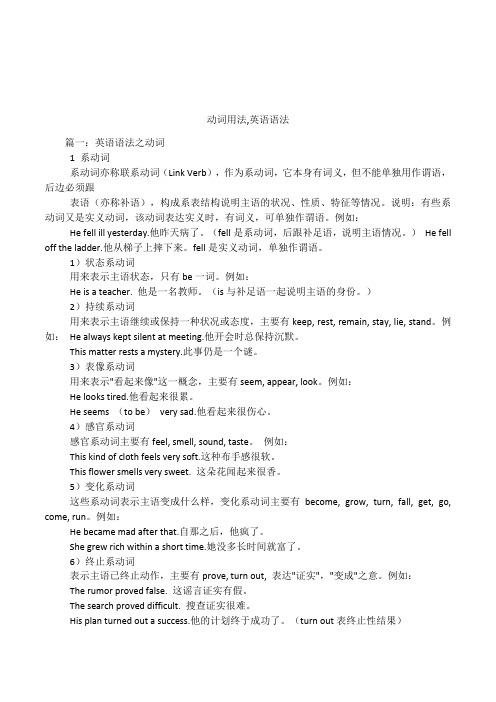
动词用法,英语语法 篇一:英语语法之动词 1 系动词 系动词亦称联系动词(Link Verb),作为系动词,它本身有词义,但不能单独用作谓语, 后边必须跟 表语(亦称补语),构成系表结构说明主语的状况、性质、特征等情况。
说明:有些系 动词又是实义动词,该动词表达实义时,有词义,可单独作谓语。
例如: He fell ill yesterday.他昨天病了。
(fell 是系动词,后跟补足语,说明主语情况。
) He fell off the ladder.他从梯子上摔下来。
fell 是实义动词,单独作谓语。
1)状态系动词 用来表示主语状态,只有 be 一词。
例如: He is a teacher. 他是一名教师。
(is 与补足语一起说明主语的身份。
) 2)持续系动词 用来表示主语继续或保持一种状况或态度,主要有 keep, rest, remain, stay, lie, stand。
例 如: He always kept silent at meeting.他开会时总保持沉默。
This matter rests a mystery.此事仍是一个谜。
3)表像系动词 用来表示"看起来像"这一概念,主要有 seem, appear, look。
例如: He looks tired.他看起来很累。
He seems (to be) very sad.他看起来很伤心。
4)感官系动词 感官系动词主要有 feel, smell, sound, taste。
例如: This kind of cloth feels very soft.这种布手感很软。
This flower smells very sweet. 这朵花闻起来很香。
5)变化系动词 这些系动词表示主语变成什么样,变化系动词主要有 become, grow, turn, fall, get, go, come, run。
例如: He became mad after that.自那之后,他疯了。
考研英语语法(动词)详细解析总结(含例句)

考研英语语法(动词)详细解析总结(含例句)●一. 动词的分类后续语法内容的基础,同学们只需要了解清楚这些概念、能够明白区分,在后续长难句分析时对这些说法不陌生即可,不然遇到完形填空和翻译会一头雾水哦1.可作谓语动词:句子的核心句子成分中的谓语●实义动词:也叫做行为动词,因为这些动词都拥有实际的意义在考研英语中大部分的遇到的其实只需要区分及物和不及物动词,通常会在完形填空的选项和翻译中进行考察,但还是希望同学们能够认真学习理解,为自己的英语长难句打下坚实的基础●按照是否需要动作的承受者划分●及物动词:需要带个人或者物品在动词后面,就是说动作是有对象的,即宾语eg. read a book 读一本书●不及物动词:可以独立完成的动作,即动作没有对象eg. A cat sleeps. 一只猫睡觉●按照状态动作划分●动作动词:可以动起来的动作eg. eat 吃●状态动词:相对静止,表示一种状态eg. have 有;feel 感觉;own 拥有●系动词:也叫做连系动词,连系主语和表语●非常好理解,就是“赋值”的意思,把系动词后面的含义赋予给它之前的部分●am;is;are●eg. I am a girl. 我是一个女孩 (am的作用就是把女孩这个信息赋予给我)●keep;stay;seem;appear;feel;become;turn...●eg. The sky grew dark. 天空渐渐变暗(就是把暗这个信息赋值给天空)2.可辅助构成谓语动词:助动词不能独立做句子的谓语●概念●句子中的谓语动词本身有时候无法独立表达某些语法概念,需要其他词的辅助来表达;而这类辅助词自己本身不能做谓语动词●eg. The student will read a book. 这个学生将看书【如果我们想要表达将来时态,但动词本身并不能表达将来的意思,所以久必须在前面加上will来“辅助”完成表达;will就是构成将来时的助动词,并且will本身不能做谓语动词】●特征(判断)●(是否)辅助主动词构成语法概念●(是否)不能单独作谓语动词●分类●基本助动词:be;do;have作为助动词时,他们本身没有什么任何实际含义,但是要注意他们也可以作实义动词:be 存在;do做;have有●eg. The student is reading a book. 学生正在看书(辅助构成现在进行时)●eg. The student has read a book. 学生已经看过书了(辅助构成现在完成时)●eg. I do like you!我真的喜欢你(辅助构成强调句)●情态(助)动词注意:前三组后面的词是前面的过去式●can/couldcould在虚拟语气中更多使用●表能力(做…);会…;可以…●eg. I can read a book. 我可以看书(有能力)●eg. Can/Could I borrow your money?我可以找你借钱吗?(表请求或许可)●eg. Anything can happen. 什么事都可能发生(可能性)●may/might●表达请求,同上●或许;也许,表可能性,可能性程度小于can/could●表祝愿 eg. May you succeed!祝你成功!●shall/should●shall●构成将来时,同will●表推测、征求意见 eg. Shall we meet tomorrow?我们明天见怎么样?●表警告、命令 eg. You shall not pass!你不能通过!●should●表应当 eg. You should study now!你现在应该去学习!●表有一定根据的推测 eg. It should rain tomorrow. 明天应该会下雨(有天气预报一定的根据性)●构成虚拟语气(后续学习)●will/would●构成将来时(后续时态学习)●表请求、建议 eg. Will you lend my money?你愿意借我钱吗?●表推测、假设 eg. Ask him,he will/would know. 问他吧,他可能知道●must●表必须 eg. You must finish your homework!你必须做完作业!●表禁止 eg. You must not(mustn't)smoke here. 这里禁止吸烟注意:must not不是“不必须”的意思,而且“必须不”!●表肯定 eg. You must be hungry.(干饭时间到了)你肯定饿了吧●ought to 同should:应该●dare/dared 敢 eg. How dare you!你好大的胆子!●need●实义动词:需要 eg. I need you!我需要你!●情态动词:需要;有必要 eg. You don't need to study. 你不需要学习【相当于must表不需要的否定】●used to●表过去经常的事情,强调与现在的对比●eg. I used to eat apples,now I only eat bananas. 我过去经常吃苹果,但我现在只吃香蕉●半助动词:既像主动词又像助动词●be able to 表能力同can/could●表将要做,同will●be going to●be about to●had better3.不可作谓语动词:非谓语动词(非限定性动词)一个简单句中只能有一个谓语动词,所以其他动词只能以非谓语动词的形式出现●概念●不受主语限制、不被限定的动词,不具有表达时间和人称的作用(与谓语动词相反)●eg. I like to study. 我喜欢学习(like就是句子的谓语动词,受主语限制:helikes;而to study则不受主语限制)●不定式:to do(to + 动词原形)●充当句子主语 To eat an apple everyday is good for health. 一天吃一个苹果对健康有好处(to eat 不定式不受具体的人和时间限制)= It is good for health toeat an apple everyday. (虽然it做了形式主语,单核心还是to eat 不定式)●作后置定语 I have many books to read. 我有很多书要看(to read做后置定语来修饰books:我有很多书,什么样子的书呢?需要阅读的书)●作状语●表原因 I am surpised to get a thumbs-up. 我很惊讶(因为)得到一个赞= I am surpised because I get a thumbs-up.●表目的 I study to pass exams. 我复习为了考试顺利= I study in order that I can pass exams.●高级不定式:与后续时态结合●动名词:doing(动词原形+ing)●从名字也可以知道,就是把动词转化为名词性质使用,本质相当于名词●eg. Seeing is believing. 眼见为实(seeing作主语;believing作表语)●现在分词:doing(动词原形+ing)●本质相当于形容词,起修饰作用【表主动关系:描述做动作的人/物】●eg. The book is interesting. 这本书很有趣(书主动令人感到很有趣)●过去分词:done(一般动词原形 + ed,不规则动词需要积累记忆)●本质相当于形容词,起修饰作用【表被动关系:描述动作的接收者】●eg. I am interested in the book. 我对这本书感兴趣(我被这本书引起了兴趣)●二. 动词的时态动作的时间+动作的状态1.前言●英语的十六大时态●4种时间与4种状态排列组合就是英语语法的16种时态,但是时态体系过于庞大复杂,许多时态也非常少见,我们只需要学习常见的时态即可●时间:现在;过去;将来;过去将来【对于过去某一个时间点的将来,eg.昨天是前天的将来】●状态:一般;进行;完成;完成进行【动作完成了一部分,仍在进行】●为什么大家之前学习英语时态觉得是一团乱麻呢●难点1:时间&状态搅在一起在学校学习时态时,总是遇到一个时态学习一种时态,通常就是一会学过去完成时一会又是学一般现在时,没有清晰地认知时间和状态组合的方式,脑子里的时态杂糅在一起,让大家觉得时态很复杂很难●难点2:动词的变位在中文表达里,对于一个动作的完成和进行描述地非常简洁,例如:我正在吃饭;我吃饭了但是在英语里,则需要大家记动词的不同形式,eg.eat~ate~eaten 原型~过去式~过去分词●难点3:助动词英语时态的表达通常还需要助动词进行辅助,并且助动词会随着时态有不同的变形,例如助动词have,在现在完成时使用是have(has),而在过去完成时里使用是had2.1一般现在时●概念理解●动作发生在“现在”的时间段内经常发生的动作或者存在的状态●1. 表达事实没有状态限制,也没有时间限制●陈述一些事实、具有真理性的内容●eg. The sun rises in the east. 太阳从东边升起●eg. You love to learn. 你热爱学习●2. 表达习惯性、规律性、重复的动作●eg. I read books. 我阅读(我的习惯)(每天都发生的事情)●eg. You get up at 7 o'clock everyday. 你每天七点钟起床●3. 表达预计发生的事(客观的事实)●eg. The bus leaves at 6 PM tonight. 公交车今晚六点离站●形式用法●第一人称/第二人称/名词复数 + 动词原形●eg. We usually go to school at 7:30. 我们通常七点半去上学●eg. My parents work five days a week. 我的父母一周工作五天●第三人称单数(单三)+ 动词原型 + s注意:有些动词的单三形式有特殊变形,+s是普遍情况●eg. He likes to swim. 他喜欢游泳●eg. She goes shopping every weekend. 她每周末都去逛街3.2现在进行时●概念理解●动作发生在“现在”动作正在进行中,相当于中文中的“正在做某事”●形式用法●助动词be的变位(am/is/are)+ 动词的现在分词(动词原形 + ing)注意:有些动词的特殊变位需要大家积累记忆;例如:write去e+ing、get双写t+ing●eg. You are reading a book. 你正在看书●eg. I am writing papers. 我正在写论文●eg. She/He is doing homework. 她/他正在做作业4.3现在完成时●概念理解●1. 表示强调动作的影响或是结果●动作发生在“过去”并且已经完成这个动作对现在仍存在影响,强调对现在的影响●eg. I have lost my pen. 我的钢笔丢了(结果:我现在没有钢笔用)●eg. He has finished his work. 他的工作已经完成了(结果:他可以去休息了)●2. 表示动作的持续●动作从“过去”开始发生但还没有结束一直持续到现在,也可能还会持续下去●eg. You have been in school for 22 years. 你已经上学22年了(你从过去开始上学,持续到现在,已经持续22年了,你还可能继续持续下去)●eg. He has been busy since last week. 他从上周开始就一直很忙(持续到现在也很忙)●形式用法●助动词have的变位(have/has) + 动词的过去分词(通常动词原形 + ed)注意:有些动词的特殊变位需要大家积累记忆;例如:do~did~done●eg. I have been Wuhan before. 我之前去过武汉●eg. She hasn't finished her work yet. 她还没有完成工作5.4现在完成进行时●概念理解●动作从“过去”开始发生一直持续到现在,并且还会持续下去●可以理解为现在完成时和现在进行时的合体,强调动作的持续性●形式用法●助动词have的变位(have/has)+ been + 动词的现在分词●eg. The rabbit has been eating carrots. 兔子一直在吃胡萝卜(兔子已经吃了一段时间,还将继续吃下去)●eg. I have been watchinig this movie. 我在看这一部电影(我到现在为止已经看了一段时间了,我还要继续再看一段时间)6.5一般过去时●概念理解●就是一般现在时往前推了一个时间,动作发生在“过去”的时间动作发生了●形式用法●各人称 + 动词过去式(通常是动词原形 + ed)注意:不要与过去分词混淆,特殊动词需要记忆,例如:go~went;take~took●eg. I/We/You/He/She/It/They/The rabbit ate a carrot. 我/我们/你(们)/他/她/它/他们/这只兔子吃了一根胡萝卜7.6过去进行时●概念理解●动作发生在“过去”的某个时间段动作是当时进行中的●形式用法●助动词be的变位(was/were)+ 动词的现在分词(动词原形 + ing)●eg. I/He/She/It/The rabbit was eating a rabbit. 我/他/她/它//这只兔子吃了一根胡萝卜(在过去的某个时间点正在吃胡萝卜的过程)●eg. You/We/They were reading books. 你(们)/我们/他们处于过去的某个时间点正在看书的过程8.7️过去完成时●概念理解●就是现在完成时态往前推一个时间段,动作发生在“过去”并结束相对于过去的某一个时间造成了影响●形式用法●助动词have的变位(had) + 动词的过去分词(通常动词原形 + ed)●eg. I had eaten 5 carrots for lunch yesterday,so I wasn't hungry last night. 我昨天午饭吃了五根胡萝卜,所以我昨晚不饿(昨天中午发生的动作对昨天晚上造成了影响:我不饿)●eg. He tried to find me yesterday afternoon,but I had already gone to Wuhan. 他昨天本来想找我,但是我已经去武汉了(我可能昨天早上、前天——比昨天下午早的时间去武汉了,对昨天下午造成了影响:他没有找到我)9.8️一般将来时●概念理解●表示动作发生在“将来”的某一时间点动作将会发生(说话者十分肯定)●形式用法●各人称 + will + 动词原形这是最常见的将来时表达方式●eg. I/We/You/He/She/It/They/The rabbit will eat a carrot. 我/我们/你(们)/他/她/它/他们/这只兔子将要吃一根胡萝卜10.9️将来进行时●概念理解●就是现在进行时往后推了一个时间段,动作发生在“将来”的某个时间段动作是在当时进行的过程中●形式用法●will + 助动词be + 动词的现在分词(动词原形 + ing)●eg. I/We/You/He/She/It/They/The rabbit will be eating a carrot for dinnertomorrow. 我/我们/你(们)/他/她/它/他们/这只兔子明天晚餐将会在吃一根胡萝卜(明天晚餐这个时间会处于吃胡萝卜这个动作的过程中)11.将来完成时●概念理解●就是现在完成时态往后推一个时间段,动作发生在“将来”并结束相对于未来的某一个时间造成了影响●形式用法●will + 助动词have + 动词的过去分词(通常动词原形 + ed)●eg. I will have finished doing my homework by 4 PM tomorrow,so I can goshopping after that. 我将在明天下午四点前写完作业,那样我之后就可以去逛街了(对于明天下午四点钟这个时间点完成作业将会对明天晚上造成影响:我可以出去逛街)●三. 动词的语气1.陈述语气:描述事实(句号结尾)●前面时态中的所有例句均是陈述语气2.祈使语气:命令/请求(通常会以感叹号结尾)●一般会使用第二人称“你” + 一般现在时●去掉“你”,保持动词原形●eg. Go to school!(you go to school!)●eg. Never give up!(you never give up!)●eg. Don‘t do th at!(you don’t do that!)3.虚拟语气:与现实相反的●其实虚拟语气在中文中也常常有表达,只是英语的难点在于动词需要变位●表“不可能”的假设●【与现在事实相反】描述主观意愿,或者想象的假设●条件句:(if)过去式;主句:would + 动词原形●eg. If I knew that,I would tell you. 如果我知道我就会告诉你了(这里说的就是其实过去,在当时我并不知道)●eg. If I were you, I would study hard. 如果我是你,我会努力学习(但我不可能是你,描述了我的主观意愿假设)注意:虚拟语气中be动词的过去式不论人称,均是were●【与将来事实相反】描述可能性很小的事情●条件句:should (在这里是shall的过去式,不是“应该”)+ 动词原形;主句:would + 动词原形●eg. If I should meet you after long years,how would I greet you?如果多年以后再见到你,我又该如何面对你?(言下之意就是说我俩相逢遥遥无期,不怎么可能会重逢)●【与过去事实相反】描述与过去已经发生的事情相反,不可能的事情●条件句:had + 动词过去分词;主句:would have + 动词过去分词●eg. If I had learned grammer before,I would have passed my exam. 我要是之前就学过语法,我肯定上岸了(说明我过去并没有学过语法,多半可能就是我没上岸)●表达愿望、请求、建议等,就是“希望某个事情能发生”(常常是发生在我们的脑海中的)●对现在的愿望●wish + 动词过去式●eg. I wish that I were a boy. 我希望我是男孩(我希望我现在能是个男孩子)●对过去的愿望●wish + had/would have + 动词过去分词●eg. I wish I had eaten that carrot. 我希望我吃了那个胡萝卜(后悔啊我当时没吃)●对未来的愿望●wish + should/would/could/might + 动词原形●eg. I wish I could eat that carrot. 我希望我能吃那个胡萝卜(伤心啊我可能根本吃不到的)●表达愿望、请求、建议等。
2020考研英语:英语语法之系动词

2020考研英语:英语语法之系动词考研英语有许多题目组成,方便大家及时了解,下面由小编为你精心准备了“2020考研英语:英语语法之系动词”,持续关注本站将可以持续获取更多的考试资讯!2020考研英语:英语语法之系动词一说到系动词,很多同学会脱口而出系动词就是be动词,这样说不够各方面准确,其实be动词只是系动词的其中一类,表现形式就是“am,is,are”以及它的其他时态,比如过去时“was,were”,完成时“has been,have been,had been”。
关于be动词相信大家还是比较熟悉的,在这里老师不再赘述。
我要给大家详细讲解的是除了be动词以外的其他五类系动词,下面老师结合例子给同学们一一讲解:第一类叫做表像系动词,比如:seem,appear。
seem这个词同学们应该比较熟悉,通常翻译为“似乎,好像”,但是appear这种既有实义动词意思又有系动词意思的单词,在翻译时就需要引起同学们的重视,比如我举两个例子:he appeared suddenly他突然出现了。
He appears unhappy他好像不开心。
那么大家也注意到了appear在两个例句中分别表示的是不同的含义,因为在第一句中,appear做实义动词,所以意为“出现”,而在第二句中做系动词,所以意为“似乎,好像”。
那么究竟如何区分呢?很简单,做实义动词时,后面通常接副词,而做系动词时,后面通常接形容词或名词。
第二类叫做感官系动词,比如:sound,look,smell,taste,feel。
这五个系动词分别对应着人的五种感官,所以称之为感官系动词,这些系动词后面都可以接形容词做表语,比如:it sounds good,the fish smells good,the cloth feels smooth,she looks beautiful,it tastes sweet.翻译时意思比较固定,不算很难。
第三类系动词叫做持续系动词,比如:keep,remain,stay.这些系动词后面接形容词时表示的含义都是“保持”,比如:keep silent“保持沉默”,remain做系动词时指的是某人或某事物仍保持某种状态,意为“仍然”,比如:The situation remain s tense.“局势依旧很紧张”。
2020考研英语:名词性语法内容解析(2)
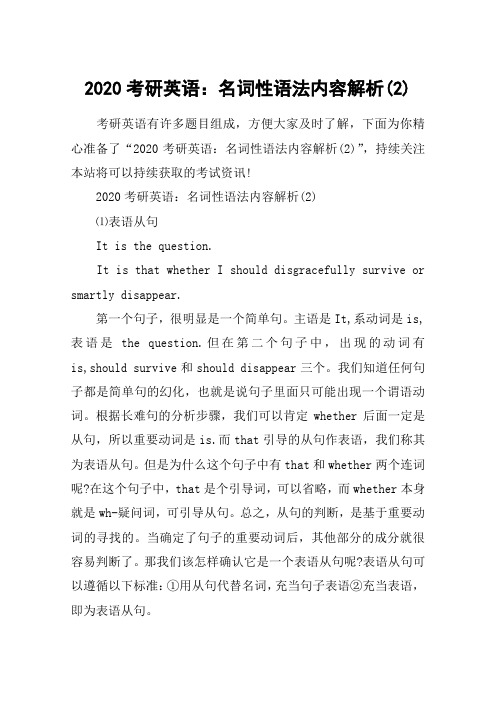
2020考研英语:名词性语法内容解析(2) 考研英语有许多题目组成,方便大家及时了解,下面为你精心准备了“2020考研英语:名词性语法内容解析(2)”,持续关注本站将可以持续获取的考试资讯!2020考研英语:名词性语法内容解析(2)⑴表语从句It is the question.It is that whether I should disgracefully survive or smartly disappear.第一个句子,很明显是一个简单句。
主语是It,系动词是is,表语是the question.但在第二个句子中,出现的动词有is,should survive和should disappear三个。
我们知道任何句子都是简单句的幻化,也就是说句子里面只可能出现一个谓语动词。
根据长难句的分析步骤,我们可以肯定whether后面一定是从句,所以重要动词是is.而that引导的从句作表语,我们称其为表语从句。
但是为什么这个句子中有that和whether两个连词呢?在这个句子中,that是个引导词,可以省略,而whether本身就是wh-疑问词,可引导从句。
总之,从句的判断,是基于重要动词的寻找的。
当确定了句子的重要动词后,其他部分的成分就很容易判断了。
那我们该怎样确认它是一个表语从句呢?表语从句可以遵循以下标准:①用从句代替名词,充当句子表语②充当表语,即为表语从句。
⑵同位语从句We found out the fact,the murder.We found out the fact. We found out the murder.We found out the fact that he was killed.在了解同位语从句之前,我们先看几个句子。
第一个句子的主语和句意均完整,在这个句子中the murder是名词作同位语,解释前面的名词fact的内容。
其实这句话是一个句子的省略,我们可以将其还原成两个句子,并且都是名词性的宾语:We found out the fact. We found out the murder.我们可以发现the fact 和the murder是充当同样位置的语言内容,是为说明句子内容的。
- 1、下载文档前请自行甄别文档内容的完整性,平台不提供额外的编辑、内容补充、找答案等附加服务。
- 2、"仅部分预览"的文档,不可在线预览部分如存在完整性等问题,可反馈申请退款(可完整预览的文档不适用该条件!)。
- 3、如文档侵犯您的权益,请联系客服反馈,我们会尽快为您处理(人工客服工作时间:9:00-18:30)。
2020考研英语:英语语法之系动词
考研英语有许多题目组成,方便大家及时了解,下面由我为你精心准备了“2020考研英语:英语语法之系动词”,持续关注本站将可以持续
获取更多的考试资讯!
2020考研英语:英语语法之系动词
一说到系动词,很多同学会脱口而出系动词就是be动词,这样说不够各方面准确,其实be动词只是系动词的其中一类,表现形式就是“am,is,are”以及它的其他时态,比如过去时“was,were”,完成时“has been,have been,had been”。
关于be动词相信大家还是比较熟悉的,在这里老师不再赘述。
我要给大家详细讲解的是除了be动词以外的其他五类系动词,下面老师结合例子给同学们一一讲解:
第一类叫做表像系动词,比如:seem,appear。
seem这个词同学们应该比较熟悉,通常翻译为“似乎,好像”,但是appear这种既有实义动词意思又有系动词意思的单词,在翻译时就需要引起同学们的重视,比如我举两个例子:he appeared suddenly他突然出现了。
He appears unhappy他好像不开心。
那么大家也注意到了appear在两个例句中分别
表示的是不同的含义,因为在第一句中,appear做实义动词,所以意为“出现”,而在第二句中做系动词,所以意为“似乎,好像”。
那么究竟如何区分呢?很简单,做实义动词时,后面通常接副词,而做系动词时,后面通常接形容词或名词。
第二类叫做感官系动词,比如:sound,look,smell,taste,feel。
这五个系动词分别对应着人的五种感官,所以称之为感官系动词,这些系动词后面都可以接形容词做表语,比如:it sounds good,the fish smells good,the cloth feels smooth,she looks beautiful,it tastes sweet.翻译时意思比较固定,不算很难。
第三类系动词叫做持续系动词,比如:keep,remain,stay.这些系动词后面接形容词时表示的含义都是“保持”,比如:keep silent“保持
沉默”,remain做系动词时指的是某人或某事物仍保持某种状态,意为“仍然”,比如:The situation remains tense.“局势依旧很紧张”。
stay在做实义动词时表示的含义是“待在..地方”,比如stay at
home“待在家里”。
但是stay calm,stay still这些怎么翻译呢?这个时候你会发现stay后面接的都是形容词,所以在翻译时都翻译为“保持冷静”和“保持静止”。
怎么区分?也就是当stay后面接形容词时做系动词用,翻译为“保持”。
再比如第四类变化系动词:
become,go,turn,come,run,get,fall,grow。
变化系动词顾名思义就是这一组单词都强调“变得...”这层意思。
比如become bigger“变得更大”,the leaves turn yellow“树叶变黄了”,这两个单词还比较简单,带入到短语中我们也可以比较顺畅地翻译出来,但是接下来我们要给大家展示的例子可能就不太好理解了,因为他们既有实义动词的意思也有系动词的意思,关键是两者意思相差很大。
例如:our dream has come true“我们的梦想成真了”。
Run uncontrolled “变得不受控制”。
get better“变得更好”,fall asleep “睡着了”,fall ill “生病”,go bad“变质” grow unfashionable“过时”。
你会发现在这几个短语中,我们熟悉的come,go,fall,run并不是翻译为大家常见的那个意思,那是因为在这里他们都是作为系动词来使用的,所以都翻译为“变得....”。
像这类变化系动词中有四个单词是需要我们格外关注的,因为他们的实义动词意思和系动词意思相差甚远,稍不留神翻错了就很难理解句意。
还有最后一类叫做终止系动词,比如:prove,turn out,这组系动词强调事情的结果,prove翻译为“证明是...”turn out翻译为“结果是....”。
下面给大家举几个例子:the news proves false这则消息被证实是假的。
The weather turns out to be fine .结果证明天气是晴朗的。
以上就是关于系动词的六大类型的讲解,当然了,同学们不用刻意地去记忆它的分类名称,你们需要掌握的就是那些实义动词意思和系动词意思差别很大的几个系动词,在这里有六个需要大家特别关注的:appear,stay,go,come,run,fall。
好是结合短语来帮助记忆。
好了,以上就是关于六大系动词的介绍以及他们的翻译方法,希望对大家有所帮助。
